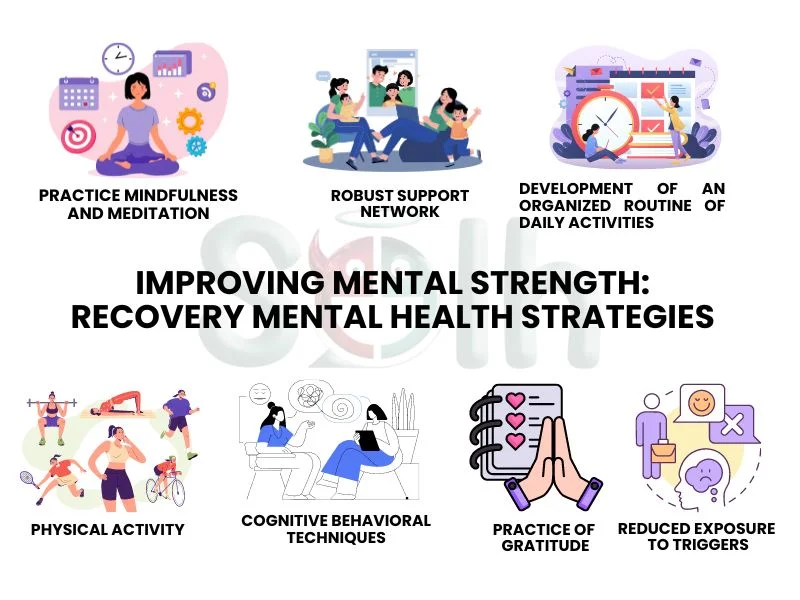The mind and body act as one and must be nurtured simultaneously to recover successfully. While the recovery process focuses on the body, ultimately, mental well being has a lot to do with the outcome of the recovery journey. Mental well being helps guide individuals as they face stress and navigate emotional temptations to hold up well throughout treatment.
This blog discusses different recovery strategies that may improve mental health and provides helpful tips for overcoming emotional barriers to protracted recovery.
Role of Mental Health in Recovery
Recovery often involves more than taking away physical barriers. It crosses over emotional and psychological obstacles, which can lead to significant setbacks. Emotional challenges that may act like an anchor include pressure, fear, anxiety, worry about probable relapse, and uncertainty about the future ahead weigh much on the head. Mostly, these emotions bring with them thoughts of doubt and frustration. For example, for addiction recovery, cravings and emotions that trigger can be a big challenge to keeping track, hence likely relapse without some good mental support.
Staying in recovery for a very long period requires strong mental health and wellbeing because this brings the building of resiliency-which will help someone to navigate bumps in the road, manage triggers, and develop optimism. A good mental and wellbeing state also gives quality life, builds stronger relationships, good judgments, personal development, and much more.
Common Mental Health Issues Experienced During Recovery
Depending on the direction from which the individual is recovering, several common mental health challenges come up in the recovery process. In general, some of these include depression and anxiety. Depressive symptoms can result in little energy and a feeling of hopelessness and despair that can strip away the motivation to continue the process of recovery. Anxiety can arise when there is uncertainty about what the future holds; secondly, there's always a fear that they will go into a potential relapse; and lastly, there is anxiety about the outcome of recovery.
Isolation: Recovery can sometimes be lonely, as individuals become alienated from previous destructive environments or relationships.
Loss of Self-Esteem: If a person cannot develop a positive self-esteem himself/herself, he/she is more likely to lose sight of the point of recovery.
Identifying them as part of the recovery process makes it easier to deal with them. This also means using the right tools and recovery mental health strategies to strengthen one's mental health.
Improving Mental Strength: Recovery Mental Health Strategies

Making strategies is very important for improving mental wellness during recovery. It helps in numerous ways. Let's now look at some recovery mental health strategies.
Practice Mindfulness and Meditation
Mindfulness refers to staying present and fully engaged with the current moment, which can help an individual deal with overwhelming emotions. Mindfulness practices, such as deep breathing, body scans, and guided visualization, can help keep an individual rooted in the present moment, even during potentially traumatic recovery. Regular meditation, even for a short time per day, has resulted in alleviating symptoms of stress and anxiety while regulating one's emotions and building resilience.
Mindfulness is practiced through mindfulness meditation and self-practice, wherein craving memories are abstained. Mindfulness helps to manage better urges, impulses, and other negative thoughts that might mark a relapse or setback.
Robust Support Network
A good support network is a significant part of the recovery process. It can be close friends and family members but also includes formal groups like AA or NA. Being with people who understand you creates a feeling of belonging and provides an element of accountability. The experience usually shared during support groups helps lessen feelings of loneliness and provides insight into others' lives.
You should also engage other people who have interest in the goal of your recovery, which understand the issues that you are facing and can help your progress without judging you.
Physical Activity
Physical activities improve mental health recovery. Regular exercise releases endorphins, which boost mood and relieve symptoms of depression and anxiety. Walking, jogging, or yoga can get you moving through daily routines.
Even the most mundane activities such as stretching or even just a walk can lift up mood and refocus the mind, offering a healthy means to distract oneself from the negative thinking.
Cognitive Behavioral Techniques
Cognitive Behavioral Therapy is a form of therapy that aids patients in altering undesirable modes of behavior by altering their destructive thought patterns. During recovery from substance abuse, CBT can be utilized to challenge limiting beliefs one has in themselves, break faulty ways of thinking, and set these off with more balanced behavioral changes.
Thus, by practicing CBT techniques on a daily basis, a person can create fewer maladaptive coping mechanisms, enhance the regulation of emotions, and maintain a more positive attitude towards their recovery path.
Development of an Organized Routine of Daily Activities
Lack of structure often creates the feeling of overwhelming recovery. Building daily routine stability lowers uncertainty and anxieties and greatly helps in this phase, not just recovery. When the work, self-care, physical activity and rest all find space in a balanced routine, it makes things normal-very necessary at the beginning of recovery.
Simple activities to prepare for organizing a planned day include scheduling times to eat regularly, time for exercise, and other moments for reflection or relaxation.
Practice of Gratitude
Building gratitude helps shift the focus from problems to the good things in life. If developed as a practice, it helps a person keep a better outlook during recovery. Maintaining a gratitude journal can help record small wins and moments.
Acknowledge these small milestones and they can quickly give one back much motivation as well as the belief that recovery is actually possible.
Reduced Exposure to Triggers
Triggers, emotional, physical, or situational, will chase recovery away. The knowledge and preparation for such triggers before they begin causing some trouble go hand in hand with the formation of the cornerstone of mental well-being: maintaining it. For example, if specific surroundings or personalities raise cravings or unwanted emotions in you, stay away from such conditions and people.
Techniques such as visualization, distraction, or the creation of a safe refuge can limit the effects of triggers and, hence, the relapse into a setback.
The Contribution of Professional Support
Even though self-care strategies must be adopted, professional help is usually required for effective recovery. Therapists, counselors, and even recovery coaches can provide support. They offer services tailored to the specific mental health needs of every recovering patient. Experts can facilitate the discovery of coping skills, maintain accountability, and provide a safe environment to deal with all those stubborn feelings.
It then becomes a step to seeking help professionally in case emotional difficulty hits due to overwhelming feelings, something that will make one find a way of being drawn back to an undesirable track. Whether it is through therapy or group counseling, professional intervention ensures that the necessary tools are provided for individuals to survive the emotional struggles associated with recovery.
Monitor Progress and Celebrate Small Wins
Tracking emotional and mental progress is, of course, crucial to recovery. Journaling, using mood-tracking apps, or simply establishing a weekly reflection routine can help individuals see how far they have come in their recovery. It reminds them that recovery is not a destination reached but a journey, and every little step counts.
The small victory could be a week without substance use or the effective management of stress healthily, reinforcing self-worth and motivation. At such times, he is reminded that no matter how slow they may be, he is indeed moving ahead.
Conclusion
Mental well being forms the core of long-term recovery. When dealing with any form of physical illness, addiction, or emotional burnout, people need to begin taking care of their mental health and wellbeing so they are empowered to sustain their forward momentum and work toward a meaningful life. Mindfulness, building suitable support systems, engaging in physical activities, and getting professional help will help the person develop resilience through the emotionally challenging aspects of recovery.
Recovery is a process, with every minor triumph taken bringing an individual closer to their final goal- recovery. Determination, hope, and the right approach are all that transform people out of the recovery process into stronger and more resilient, better than ever people.
Solh understands. We offer a variety of features to help you invest in self-care.
Journaling for Self-Reflection: Sometimes, being unable to care for yourself can come from a lack of self-understanding. Solh's journaling feature allows you to explore your thoughts and feelings in a safe space. By reflecting on your experiences and desires, you can clarify what stops you from self-care.
Anonymous Support Groups: You are not alone. Solh's anonymous support groups connect you with others who understand the struggle. Share your experiences, find comfort in solidarity, and discover new perspectives on overcoming the hurdle to indulge in self-care.
Solh Buddy: Feeling lost or disconnected? Your Solh Buddy, a personalized virtual companion, is here to provide encouragement and support. It can offer prompts, celebrate your victories, and remind you of your strengths as you navigate the journey toward self-care.
Talk now: Sometimes, self-care can make you feel overwhelmed. Solh's Talk Now feature gives you access to dedicated counselors who can help you navigate such situations.
Solh believes in a unique approach to introducing self-care. We empower you to take charge of your well-being by offering a variety of tools. Explore Solh today and discover the power of self-reflection, connection, and support in overcoming any problem of the mind. You are not alone on this path.








